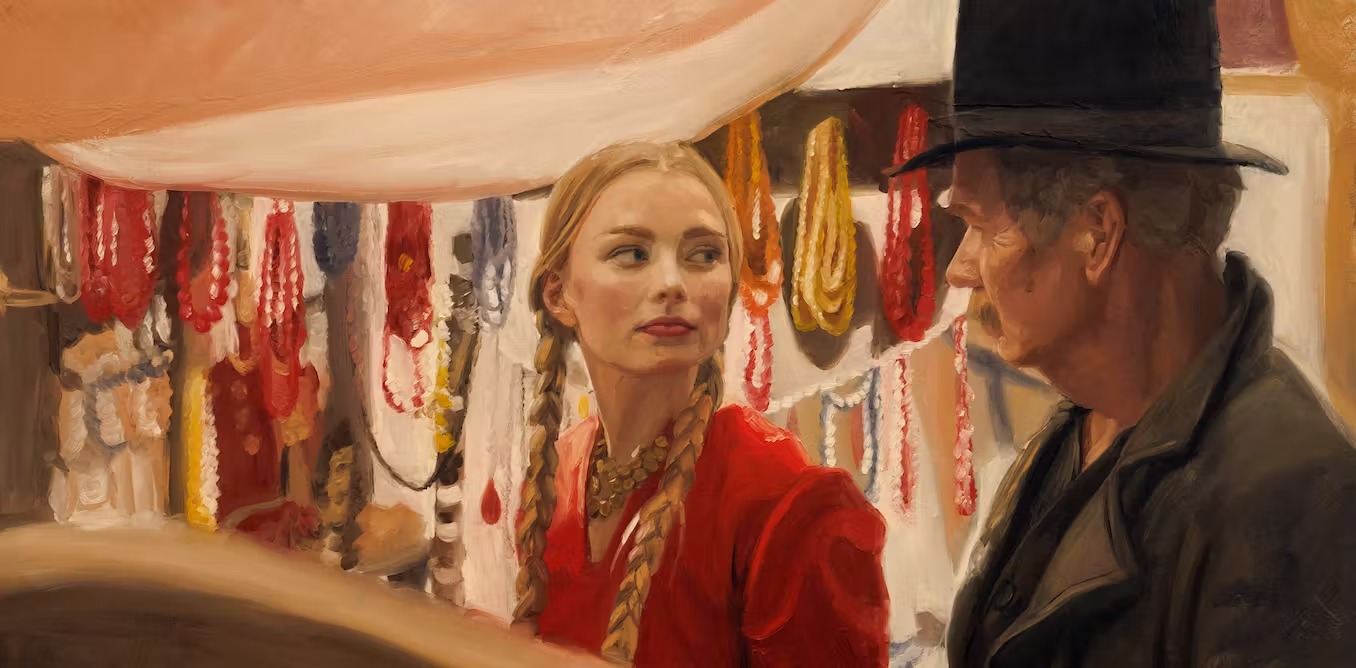The mark of a good film, for me, is the way I feel when it’s over. If I jump up to brush off the popcorn and pull on my coat, it’s forgettable fare. If I’m still glued to my seat as the final credits roll, it will probably stick with me for quite some time.
Such was the case with Loving Vincent in 2017, a beautiful film about the life and death of Vincent van Gogh. The story, about a man attempting to deliver the artist’s final letter and, in the process, unravelling the mystery around his death, wasn’t what hooked me.
It was the stunning look of the film, which made you feel as though you had tumbled headfirst through the frame of one of Van Gogh’s paintings. First filmed in live action, 125 artists then created oil paintings of each frame of the film (62,000 in total) in Van Gogh’s distinctive style.
Now, the film’s creators (husband and wife team Dorota Kobiela-Welchman and Hugh Welchman) have released The Peasants, another oil-painted masterpiece, this time adapting the Nobel-prize winning novel by Polish writer, Władysław Reymont. Our reviewer, an expert in Polish literature and culture, was pleased to find that the film stayed faithful to its source material – while also bringing fresh readings to a novel that is nearly 120 years old.
This time the visuals are inspired by famous Polish and European painters, including Ferdynand Ruszczyc, Jean-François Millet and Józef Chełmoński. Part of the fun is recognising the moments the action mirrors a famous painting, like when the main character, Jagna, turns her head in the perfect image of Vermeer’s Girl with a Pearl Earring. It’s an instant cult classic.
Another cult classic worth watching this weekend is The Wicker Man, which turned 50 on Wednesday. The film has been described as “the Citizen Kane of horror films”, and anyone who has watched it has their own unique relationship to its unnerving story.
The Wicker Man follows a devout Christian police officer (Edward Woodward) as he arrives on a remote island community, in search of a missing girl. As his investigation progresses, it soon becomes clear that the isolated people live by the rules of a thoroughly alternative belief system.
As our writer explains, the film’s director Robin Hardy thought of the film as a game. With clues at every turn to help the audience solve the puzzle, The Wicker Man rewards repeated viewings.
A Japanese history
Blue Eye Samurai is the best TV show I’ve watched this year. The Netflix anime series tells the story of a master samurai – a young woman of mixed Japanese and English heritage, living disguised as a boy – as she carves her path to revenge on her white father in Edo-period Japan. The story’s depiction of women and characters with disabilities is refreshing, and the animation stunning.
But I finished the series wondering just how realistic these depictions were, as well as its constant – and increasingly horrifying – displays of violence. This piece from historian of Japan Ruth Starr brilliantly sorts the real history of the show from moments of creative licence.
There’s more Japanese history to be learned at Japan: Myths to Manga, on at London’s Young V&A museum. Aimed at families – but with plenty to offer to solo adult visitors, too – the exhibition promises an atmospheric trip through the ways landscape and folklore have influenced Japan’s culture, technology and design. Our reviewer, a leading expert in Japanese translation, was impressed – particularly by the inclusion of clothes made by the 12-year-old artist Coco Pink, which explore themes of waste reduction.
And the winner is…
I’ve never been much of a gamer. In years gone by, I – wrongly – thought of them as timewasters. But my younger brother, an avid gamer, has taught me to see the high artistry at work in some of his favourite titles.
He plays Xenoblade because each game tells a grand narrative that players can participate in. Fire Emblem: Three Houses feels different each time he plays, with hundreds of character and plot combinations offering hours of enjoyment.
So, I was really interested to read about the six titles nominated for this year’s Game Awards – the industry’s equivalent of the Oscars. And a diverse bunch they are. We asked six experts to review the contenders: Marvel’s Spider-Man 2 was dubbed “balletic”, Super Mario Bros. Wonder “brilliant”, Baldur’s Gate 3 “hugely enjoyable”, Resident Evil 4 “unforgettable”, Alan Wake 2 “haunting”, and Zelda: Tears of the Kingdom “spellbinding”.
The best one? The judges have now declared Baldur’s Gate 3 game of the year 2023.



 Disney’s ABC Pulls Jimmy Kimmel Live! After Controversial Remarks on Charlie Kirk Killing
Disney’s ABC Pulls Jimmy Kimmel Live! After Controversial Remarks on Charlie Kirk Killing  FCC Chair Brendan Carr to Face Senate Oversight After Controversy Over Jimmy Kimmel Show
FCC Chair Brendan Carr to Face Senate Oversight After Controversy Over Jimmy Kimmel Show  How Marvel’s Fantastic Four discovered the human in the superhuman
How Marvel’s Fantastic Four discovered the human in the superhuman  The Mona Lisa is a vampire
The Mona Lisa is a vampire  Netflix’s Bid for Warner Bros Discovery Aims to Cut Streaming Costs and Reshape the Industry
Netflix’s Bid for Warner Bros Discovery Aims to Cut Streaming Costs and Reshape the Industry  Jazz Ensemble Cancels Kennedy Center New Year’s Eve Shows After Trump Renaming Sparks Backlash
Jazz Ensemble Cancels Kennedy Center New Year’s Eve Shows After Trump Renaming Sparks Backlash  Trump–Kushner Links Raise Concerns as Paramount Pushes $108B Warner Bros Discovery Bid
Trump–Kushner Links Raise Concerns as Paramount Pushes $108B Warner Bros Discovery Bid  Trump Proposes Two-Year Shutdown of Kennedy Center Amid Ongoing Turmoil
Trump Proposes Two-Year Shutdown of Kennedy Center Amid Ongoing Turmoil  George Clooney Criticizes Trump’s Tariff Threat, Calls for Film Tax Incentives
George Clooney Criticizes Trump’s Tariff Threat, Calls for Film Tax Incentives  Trump Slams Super Bowl Halftime Show Featuring Bad Bunny
Trump Slams Super Bowl Halftime Show Featuring Bad Bunny  Trump to Pardon Reality Stars Todd and Julie Chrisley After Tax Fraud Conviction
Trump to Pardon Reality Stars Todd and Julie Chrisley After Tax Fraud Conviction  Mexico Probes Miss Universe President Raul Rocha Over Alleged Criminal Links
Mexico Probes Miss Universe President Raul Rocha Over Alleged Criminal Links  Pulp are back and more wistfully Britpop than before
Pulp are back and more wistfully Britpop than before  Trump-Inspired Cantonese Opera Brings Laughter and Political Satire to Hong Kong
Trump-Inspired Cantonese Opera Brings Laughter and Political Satire to Hong Kong  Gulf Sovereign Funds Unite in Paramount–Skydance Bid for Warner Bros Discovery
Gulf Sovereign Funds Unite in Paramount–Skydance Bid for Warner Bros Discovery  6 simple questions to tell if a ‘finfluencer’ is more flash than cash
6 simple questions to tell if a ‘finfluencer’ is more flash than cash 
































